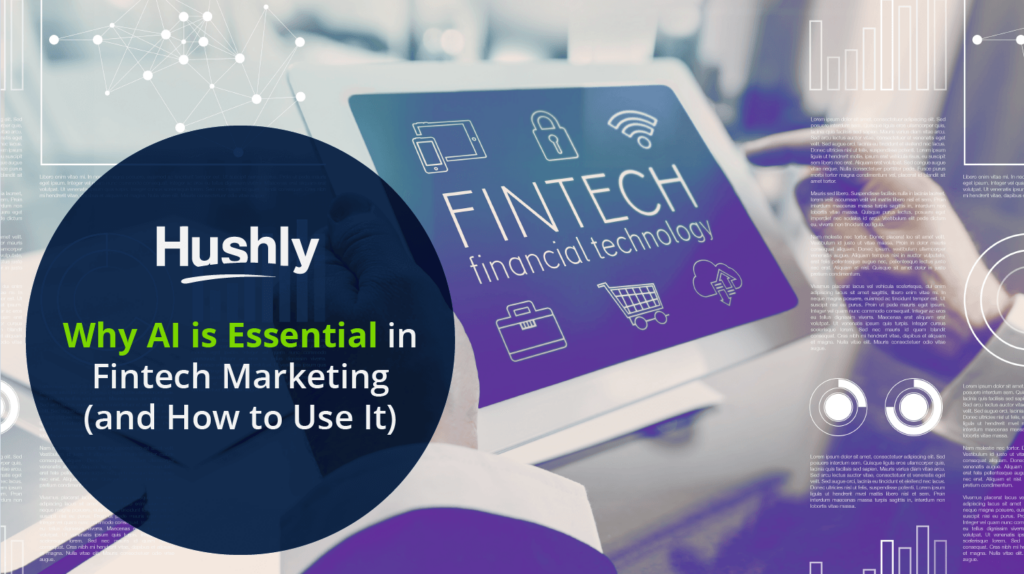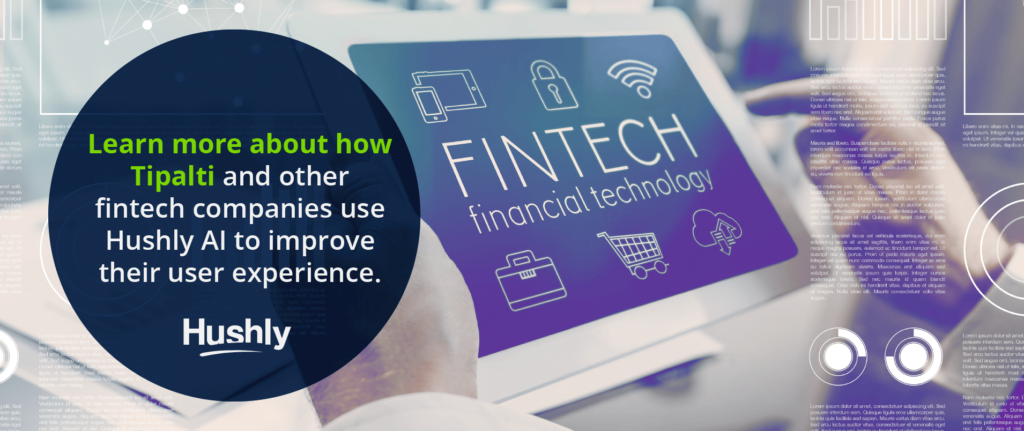Artificial intelligence is everywhere we look these days.
We open Facebook and see AI-driven alerts.
We go to Amazon and see AI-driven shopping recommendations.
We open Spotify and see AI-recommended playlists.
Those major companies set the standard: Consumers and buyers know the technology exists to create hyper-personalized experiences, so now they expect if everywhere they go online.
That’s why 84% of B2B businesses use artificial intelligence in their marketing strategies, up from less than 30% in 2018.
When it comes to AI in fintech marketing, there’s no alternative. Artificial intelligence creates hyper-personalized experiences and builds trust – when you have the right tools on your team.

The Important Role of AI in Fintech
As Deloitte says, the financial services sector is ripe for disruption. AI, by nature, is a disruptive tool.
It’s no surprise then that you see so many fintech companies arise out of AI-driven experiences. Indeed, many fintech companies today wouldn’t exist were it not for access to AI.
Take Robinhood for example:
- New traders sign up through the Robinhood app and use an automated system to link their bank account details.
- Algorithms analyze markets and current events to offer a custom buy/sell/hold percentage recommendation for most stocks.
- AI pulls relevant news stories for each stock.
- When someone places a trade, the algorithm searches for sellers/buyers behind the scenes through Robinhood’s partnerships.
- An automated chatbot answers questions and informs traders about each trade.
- AI-driven email sends out quarterly announcements for companies in traders’ portfolios and automated shareholder ballots.
- An automated system quizzes traders on their knowledge before granting them access to advanced tools like options trading.
Robinhood has developed such an amazing AI-driven app that they barely keep any humans on-staff for customer service (Robinhood’s biggest weakness).
And Robinhood isn’t alone. Chime, Acorns, Coinbase – none of these apps would exist were it not for AI technology.
Even in B2B – an industry in dire need of fintech disruption – AI is essential for creating the experience your audience expects and streamlining operations.
Neglecting to use AI’s full potential will make a fintech company look out of touch and even untrustworthy.
How to Use AI in Fintech Marketing and User Experience
Ideally, AI in fintech marketing is both omnipresent and unnoticeable. AI should power every marketing interaction but not obviously so.
1. Use AI in Fintech Marketing to Improve Your Content Experience
Personalized content is critical in fintech, where each of your leads has distinct needs, problems, and material conditions.
Once you create high-quality content for your audience segments, use artificial intelligence to optimize the on-site experience.
An AI engine lets you offer personalized content recommendations based on each visitor’s intent data and behavior, so people always have access to relevant content.
2. Improve Your Security
Consumers and businesses are already distrustful of many fintech companies they don’t understand or know well.
Use artificial intelligence to lock down your security with login alerts, two-factor authentication, fingerprinting, and biometrics. Users can still access everything on every device, but they’ll know their information is secure.
3. Make Signups and Lead Generation Seamless
Artificial intelligence can also power your entire lead acquisition process. Don’t worry; it’s not as out of control as it sounds.
Instead of forcing your leads to fill out a lengthy form, all you need is an email address and country. Human verification checks public databases to confirm the email address itself and source other pieces of information like firmographics.
Your visitors will never have to answer questions about their company or job role again.
4. Offer Free Tools and Useful Resources
Free tools and resources are vital for showing your audience why you’re trustworthy and how you can benefit their lives.
Lots of banking apps, for example, now offer gamified budgeting tools. These tools increase engagement through the app and encourage people to sign up for more services.
On your website, you can offer resources in an AI-driven interactive content hub.
5. Use AI in Fintech Marketing to Improve Lead Quality
Companies that use AI in fintech marketing strategies can see an improvement in lead quality of 79% or more.
When people consume more content, they have more time to figure out if your company is the right fit for them. Not only that, but leads who convert will be farther along in the sales funnel by the time they reach out to your sales team.
6. Alert Your Audience to Vital Information
You have so much data at your disposal. AI lets you put it to good use not only for yourself but also for your audience.
Use all the data you track to provide personalized alerts and suggestions. You could set up your system to alert customers when they have opportunities to make smart financial decisions.
Huntington, for example, analyzes essential transactions and spending to provide a personalized saving recommendation.
7. Offer Services Previously Only Accessible to Huge Corporations
AI is so revolutionary because it makes technology affordable and accessible for businesses of all sizes.
Use it!
Today, industry staples like JD Ameritrade are playing catchup to offer services to markets Robinhood has created. B2B, which desperately needs a technology-driven upgrade for payment systems, is ripe for similar disruption. Find your niche and fill it.
8. Keep Your Data Clean and Gain Better Insights
If you’re like most B2Bs, you struggle to make sense of all your data. Most businesses have data stuck in siloes where marketing and sales can’t access it properly.
Artificial intelligence helps you break down those barriers.
Plus, AI also automates insight by scanning for subtle patterns and completing tedious tasks.
Use AI in Fintech Marketing to Improve Your Content Engagement by 2,100%
Artificial intelligence is critical for connecting with your audience, earning trust, and improving your website or app experience.
That’s why fintech company Tipalti uses Hushly’s AI engine to power its website content and lead collection. Once implementing Hushly, Tipalti noticed a 597% increase in lead conversions, a 2,100% boost in engagement, and reduced work hours each week by 10.
Learn more about how Tipalti and other fintech companies use Hushly AI to improve their user experience.




